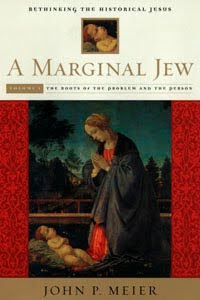
It is Easter again, and it has become a blogging tradition (observed here, and here, and here, and here) to select an Easter theme.
It has also become a blogging tradition (a) to expose charlatans, whenever they try to distort ancient history for their own ends (Mr Lindsay, your Roman Scotland web site is on a warning; Señor Carotta, you are beyond help), and (b) to correct misunderstandings (such as our favorite one: the lost Ninth Legion, mentioned most recently here).
Along the way, I have often been struck by how there really is nothing new under the sun. Particularly in the more "popular" literature, there is a tendency to present old wisdom as an exciting new discovery. I came across one such example last week.
What Day was the Last Supper?
The Roman Catholic Church calls Holy Thursday dies in qua Dominus Noster Jesus Christus tradidit discipulis suis corporis et sanguinis sui mysteria celebranda ("the day on which our Lord Jesus Christ taught his disciples to celebrate the mystery of his body and blood"). This is Maundy Thursday, named after Jesus' mandatum novum ("new commandment") to love one another (Gospel of Saint John 13:34), which he illustrated by humbly washing the disciples' feet. Three of the Gospel writers tell us that this event occurred during a Passover meal.

In the 1950s, the French biblical scholar Annie Jaubert proposed (in essays that culminated in a book, La date de la Cène, Paris 1957) that Jesus and his disciples followed a solar calendar (rather than the official Jewish lunar calendar), according to which Passover always fell on a Wednesday. By contrast, those who observed the Jewish calendar celebrated the Passover on the 15th day of the first month, no matter what day of the week it fell on.
Consequently, according to Jaubert's theory, Jesus and his disciples celebrated the Last Supper on the Tuesday evening of Holy Week. Amazingly, her theory found support in the Dead Sea scrolls, which demonstrated that the Qumran sect followed a solar calendar.
In 1963, the German scholar Eugen Ruckstuhl published a study of Jesus' movements during Holy Week, entitled Die Chronologie des Letzten Mahles und des Leidens Jesu, in which he argued that Jesus had followed this same Essene calendar. He agreed that the Last Supper was a Passover meal that had been taken not on Thursday, but on Tuesday.
Both books -- Jaubert's and Ruckstuhl's -- were translated (rather badly, it seems) into English in 1965. At any rate, we can see that, for over fifty years, theologians have been aware of a fundamental problem with the Last Supper. And of a possible -- even a plausible -- solution.

Old wine in a new skin?
Last week, I came across a new-ish book entitled The Mystery of The Last Supper by a retired physicist named Sir Colin Humphreys. He purports to solve four mysteries in a rather plodding narrative that suggests he expects his readers to be bored undergrads.
He sets himself the task of discovering what Jesus actually did on the Wednesday of Holy Week, because his Study Bible tells him that no events can be attributed to that day.
He also presents the "Passover puzzle", where he seeks to discover whether the Last Supper was a Passover meal or not. (John's Gospel seems to imply that it was not.) His third mystery concerns the timing of Jesus' trial, because there does not seem to be room to fit all the events into one day, Good Friday. And finally, for good measure, he throws in the legality of the meeting of the Sanhedrin -- could they really have convened at night, as the standard interpretation seems to require.
Maundy Tuesday?
The crux is clearly the timing of the Last Supper, an event for which any theologians who felt uncomfortable with the party line have (for the last fifty years) had a satisfactory explanation. Mademoiselle Jaubert and Herr Ruckstuhl were well aware that it needn't have occurred on Maundy Thursday. Placing it on Tuesday evening gives the various actors in Holy Week an extra two days to fit in their various movements.

Another recent book, the rather grandly titled Jesus and his Death: Historiography, the Historical Jesus, and Atonement Theory by Professor Scot McKnight, is also aware of the problem, but chooses to balance on the fence. McKnight at least has the good sense to appeal to John P. Meier's masterful book, A Marginal Jew: Rethinking the historical Jesus, which identified the Last Supper as "a solemn farewell meal, just before Passover". Meier is well-known for having questioned whether Jesus's arrest, his appearance before the Sanhedrin, his trial and condemnation, his formal handing-over to the Romans, and his trial there could really have been fitted into the night and early morning of Passover Day.
Humphreys' Mystery: Worth a read?
The rather breathlessly flattering foreword to Humphreys' book would have us believe that it is simply marvellous. In fact, it is rather slow and plodding, mostly rehashing evidence that is well-known to anyone who is at all interested in the subject. In particular, Humphrey feels that it is important to locate the Last Supper on a Wednesday, whereas Jaubert's Tuesday neatly solved the main problem of trying to cram too much into one day.
I await the scholarly reviews with interest. Happy Easter!
No comments:
Post a Comment